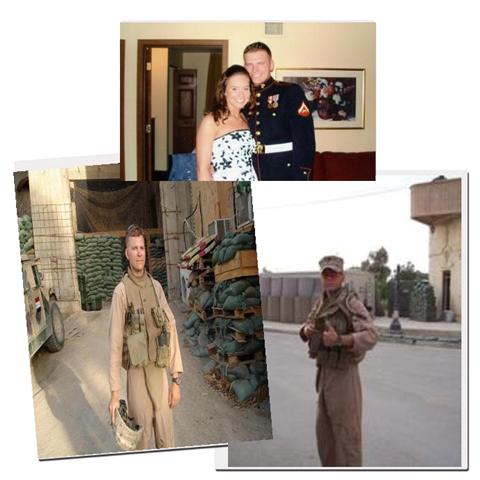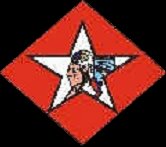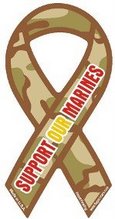All Things Considered, February 22, 2007
by Tom Bowman
·“We should be out on the street patrolling, doing what we do best.”
-U.S. Marine at his squadron leader's memorial
U.S. troops fought a six-hour gun battle with insurgents in Ramadi, the capital of Anbar province, Thursday. For years, Ramadi has been wracked with violence. Much of it was destroyed in the fighting, and many residents fled. Now American and Iraqi forces are starting to take back the city.
Ahmed Majid cooks kabobs in his open-air shop in western Ramadi. Children dart in and out.
"Five months ago, you couldn't do this," Majid says through a translator. He went to Baghdad to hide, but when that city's security deteriorated, he came back to Ramadi. The translator says, "He said the area's really nice now."
So what's changed in Ramadi? American forces are getting out of their fortified base at the edge of the city. They are setting up small outposts in the neighborhoods, and patrolling with Iraqi police.
Ramadi Mayor Latif Ayadah says through a translator, "They started looking at locations for police stations that had never seen police in the past.
"The spreading of police in neighborhoods… eradicated the terrorists in those areas, mostly, and they are fearing the police."
Ayadah knows more than most that Ramadi is far from being pacified. He was late for this interview because a car bomb injured his nephew.
But there are signs of progress. Small businesses are opening, adult literacy classes are attracting hundreds of residents, and children are returning to schools.
Young boys spill out of the Al Adel Boys School in western Ramadi. They cluster around American soldiers and talk about the fighters who once controlled this neighborhood.
"They'd tell (us) don't come to school," the boys say in Arabic. "They'd just scare us. They'd force us to go home and not go to school. They used to threaten us with guns."
A key figure in the early efforts to stabilize Ramadi has been Col. Sean MacFarland, a wiry and laconic West Point graduate.
MacFarland spent time in the Balkans. It was there he learned a key tenet of counterinsurgency warfare — cooperating with local leaders.
"The most important thing in a counterinsurgency is to separate the people from the insurgents. And we went about doing that by looking for who the local leaders are. Every place is different. In Baghdad, you have elected leaders. Out here in the tribal areas, it's the sheiks."
When MacFarland arrived last year, some of the sheiks were aligned with Al Qaeda. Many were neutral. But the tribes were vulnerable — caught in the middle of the bitter fighting.
When MacFarland started setting up small outposts, the sheiks asked for help.
He agreed to set up police stations in their areas, but only if the sheiks would provide 100 men to serve as police elsewhere in the city.
Last year there were roughly one hundred police patrolling Ramadi. Now there are about 4,000. And where there were once four outposts, there are 24, where Americans and Iraqis live together.
But there still are parts of Ramadi where Al Qaeda and other insurgents remain strong, including the city center and the eastern edge.
Maj. Scott Kish, a civil affairs officer, rides toward the city center in convoy of Humvees.
"We're going down what we call MSR Michigan – what the local Iraqis call Main Street."
It is a long and lonely stretch of urban misery. Many of the high-rise buildings are vacant. Some are partially collapsed from shelling. All are pockmarked with bullet holes.
But there are signs of color and life. A fruit stand. Then a mechanic's shop. A small playground. Children sit on swings and watch the convoy pass.
Kish says, "You see some benches in there. You see some slides. Kids playing. So that's a good thing. The bus stops are going to get repaired here in the next three weeks."
The convoy pulls into Outpost Virginia, a fortress trimmed with razor wire and topped with camouflage netting.
Maj. Daniel Zappa walks into the operations center, and points to a cluster of pins on a map. They show reports of possible roadside bombs in the eastern part of the city.
For U.S. troops here, Ramadi is a constant cat and mouse game. The Americans ply the roads in massive armored trucks called Buffalos, to disarm roadside bombs. The insurgents respond with more ingenuity.
The insurgents launch mortars and rockets at the American outposts before melting into the night. American drones circle the sky. Infrared cameras try to capture the silhouette created by an insurgent's body heat.
Into this world heads a patrol of Iraqis and American troops. They're off to talk with a source, a teacher who monitors Al Qaeda and insurgent movements.
They load their weapons and pull on their armored vests.
They walk into a city at war.
They hear gunfire, but radio back that no shots reached them. "But there is contact northeast of our position," they say.
It is a sign that the fate of Ramadi is far from certain. And there will be a high price in taking back this city.
That price has already been paid by Sgt. Joshua Frazier. Just 24. He was killed by a sniper at a marketplace in the city center.
His rifle, helmet and combat boots are set in a stand in the front of a room where Marines are holding a memorial service. A Marine stands to remember his squad leader.
"Sgt. Frazier wouldn't want us all to be thinking about the loss of a couple of days ago. Or thinking about today – but instead, that we should be out on the street patrolling, doing what we do best."
A few of the Marines wipe their eyes. Then they all file quietly out of the room.
U.S. Soldiers, Iraqi Police Unite to Redeem Ramadi
Subscribe to:
Post Comments (Atom)






No comments:
Post a Comment